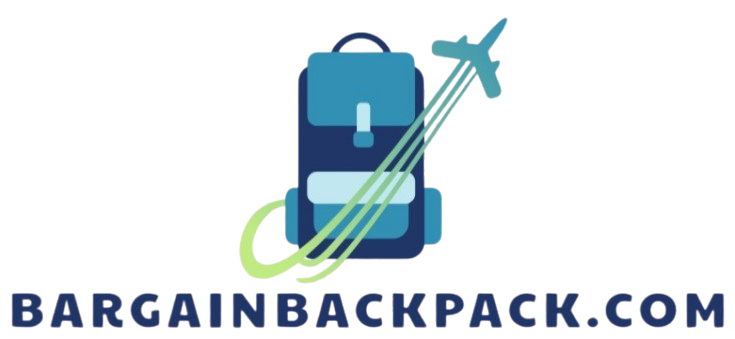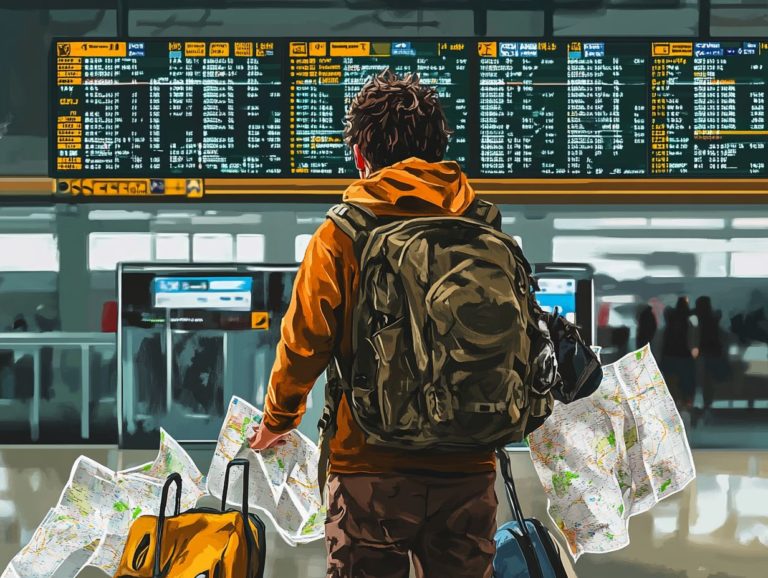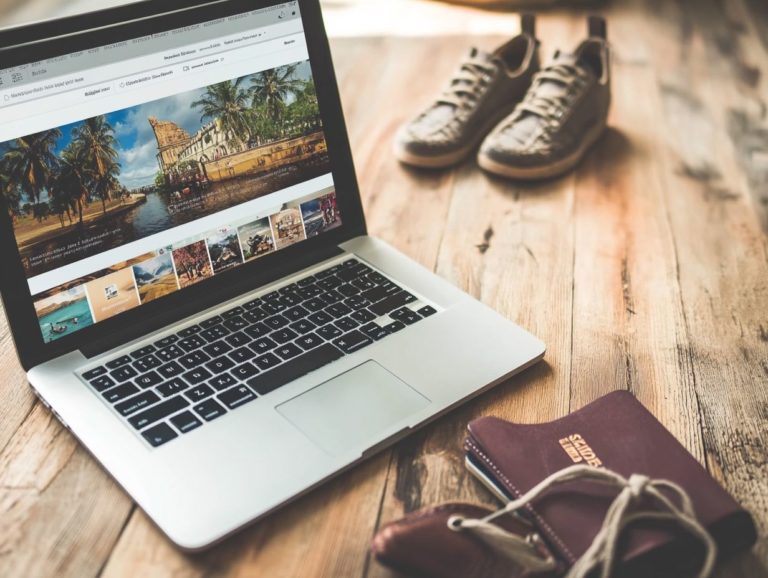Traveling on a Shoestring: Navigating Currency Exchange
Traveling can truly be an exhilarating adventure! However, the world of currency exchange presents a daunting challenge.
Understanding the details of currency exchange is essential not just for securing the best rates but also for avoiding unnecessary extra fees. This guide explores the economic and political factors that impact exchange rates and the different methods you can use to exchange money.
You’ll find valuable tips to help you save money and make the most of your travel budget. Get ready to tackle currency exchange like a pro!
Contents
- Key Takeaways:
- Understanding Currency Exchange
- Factors Affecting Exchange Rates
- Best Ways to Exchange Currency
- Tips for Saving Money on Currency Exchange
- Frequently Asked Questions
- What is the best way to exchange currency when traveling on a shoestring budget?
- Should I exchange all of my money at once, or as I go?
- What is the difference between exchanging currency at a bank and a currency exchange kiosk?
- Is it better to use cash or credit cards when traveling?
- How can I avoid being scammed when exchanging currency?
- Can I exchange currency back to my original currency after my trip?
Key Takeaways:

- Be aware of economic and political factors that can affect exchange rates when planning your travels on a shoestring budget.
- Consider all options for exchanging currency and weigh the pros and cons of each method to save money during your travels.
- Avoid hidden fees, negotiate rates, and time your exchanges strategically to save money on currency exchange.
Understanding Currency Exchange
Understanding currency exchange is essential for anyone looking to enhance their travel experiences. This is particularly important during peak seasons like spring break, when various factors can significantly influence your travel expenses.
Currency exchange involves converting your home currency into the local currency of your destination. This allows you to immerse yourself in the culture without the burden of high fees or bad exchange rates.
As you navigate the details of foreign transaction fees and exchange methods, understanding dynamic currency conversion the process of converting your transaction into your home currency at the point of sale can significantly improve your budgeting strategies and financial security.
What is Currency Exchange?
Currency exchange is the process of converting one currency into another. It s essential for travelers as it enables you to acquire local currency for your expenses. Knowing how this exchange works empowers you to get the best travel offers and minimize any hidden fees.
You have various options for currency exchange, such as banks, currency exchange kiosks at airports, and online platforms. Each method has its own rates and fees, so it’s crucial to do your research.
For example, obtaining local currency through a bank may give you better rates than airport kiosks, which often impose higher service fees.
Many travelers find value in using travel apps that compare real-time exchange rates across various platforms. These apps help you make informed decisions and often highlight the best travel deals. They can even send alerts for favorable rate fluctuations, ensuring you stay within your budget while exploring exciting new destinations.
Factors Affecting Exchange Rates
Several factors influence exchange rates. Economic and political conditions play a crucial role in determining how favorable these rates are for travelers.
Economic indicators such as inflation, interest rates, and political stability directly affect the rates you encounter while planning your budget. This, in turn, impacts your travel expenses and the security of your funds when you’re abroad.
Economic and Political Factors
Economic and political factors shape currency exchange rates, significantly impacting your travel expenses. Understanding these influences allows for effective financial planning, making it easier to manage your budget and cash.
For instance, when a country enjoys strong GDP growth, like India in recent years, its currency often strengthens. This can make traveling from countries with weaker currencies more expensive. Conversely, inflation can erode your purchasing power. A case in point is Zimbabwe, where hyperinflation has severely devalued the local currency, prompting many tourists to reconsider their travel plans.
Political stability, often seen in Scandinavian countries, tends to create a favorable environment for stronger currencies. This can lower exchange costs and make budgeting for your trips more manageable. Being aware of these dynamics is important as you prepare your itineraries and manage your travel expenses effectively.
Influence of Global Markets
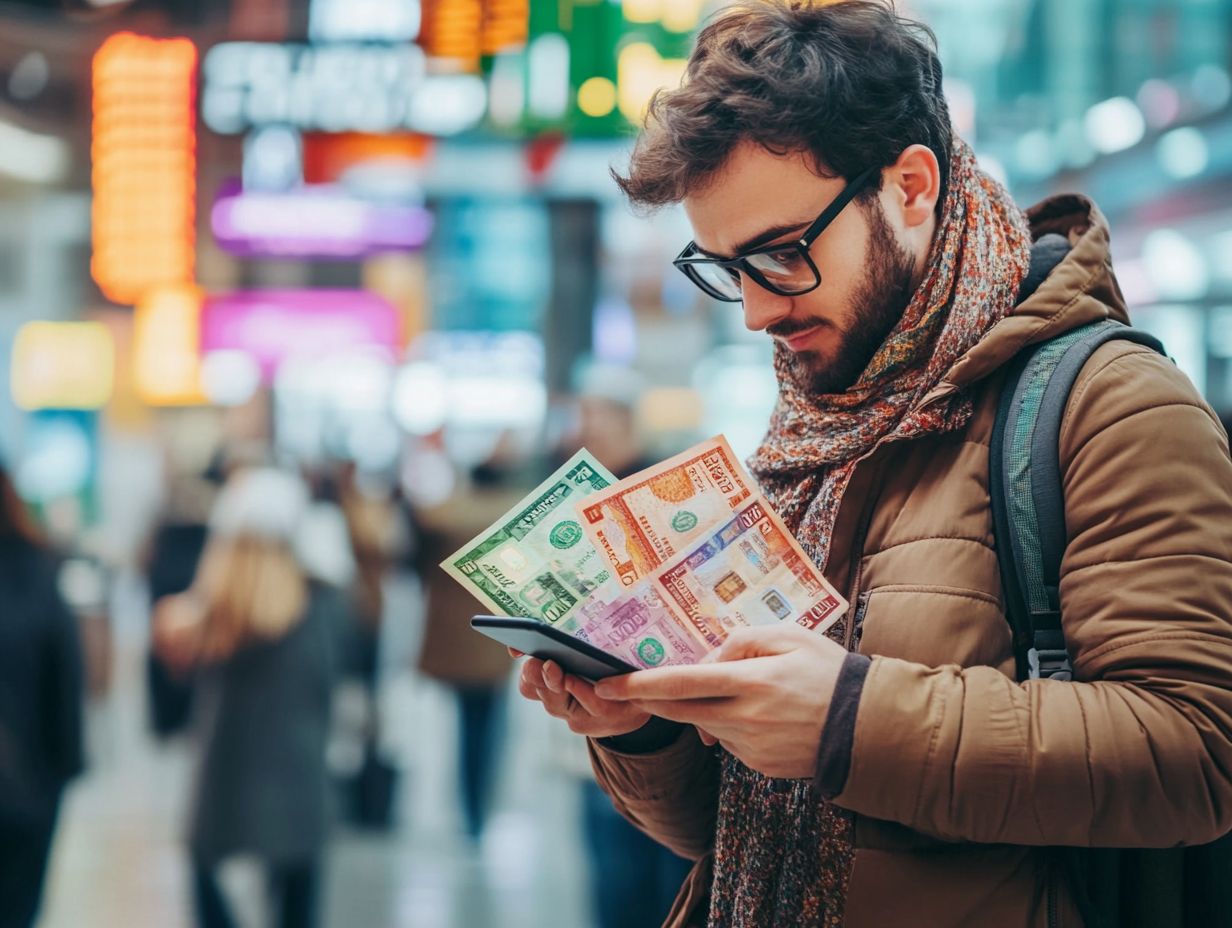
The impact of Global Markets on Currency Exchange Rates is profound. Market fluctuations can lead to varying rates that either grant you significant travel discounts or unexpectedly inflate your costs.
It’s essential to stay attuned to these shifts. This allows you to manage your Currency Risks effectively and Maximize Your Travel Budget.
The changing relationship between Stock Market Performance and Commodity Prices is crucial in determining what you can expect to pay when converting your money. When commodity prices surge, it often results in a stronger currency, making overseas trips more expensive for those who haven t secured favorable rates in advance.
A decline in stock market performance can lead to Currency Depreciation, which means your money is worth less than before. This creates an opportunity for astute travelers like you to benefit from better exchange rates.
By understanding these trends, you gain valuable insights for planning your vacations and budgeting more effectively as you navigate the ups and downs of Global Economic Conditions.
Best Ways to Exchange Currency
When you re looking to exchange Currency, several methods can guide you toward making informed choices that enhance your Travel Budget, especially during bustling periods like spring break.
Using local ATMs for automatic currency conversion is one option. You can also exchange cash at banks or dedicated currency exchange offices. Each approach carries its own set of Fees and Benefits that can greatly influence your financial planning and ensure secure transactions.
Options for Exchanging Money
You have a wealth of Currency Exchange Options at your fingertips. These include Local ATMs, Currency Exchange Offices, and travel apps designed to facilitate transactions. Each method has its own advantages and disadvantages, so it s crucial to Compare Your Choices to find the best fit for your needs.
Local ATMs offer the convenience of Withdrawing Cash with your debit or credit card, which can be a Cost-Effective Choice depending on your bank’s foreign transaction fees. Currency exchange offices, typically found at airports, provide quick access to cash but often at less favorable rates.
Apps like Revolut or Wise let you convert currency easily and often charge lower fees than traditional banks. Just keep in mind that relying on technology can be a Double-Edged Sword; connectivity issues may arise in remote areas.
Get to know these options to save money and enhance your travel!
Pros and Cons of Each Method
Understanding the pros and cons of each Currency Exchange Method is essential, especially when it comes to Optimizing Your Travel Budget and minimizing hidden fees that can derail your financial planning.
Using ATMs might offer competitive exchange rates. However, you should remain cautious of potential foreign transaction fees and surcharges that your home bank might impose.
Buying local currency in advance seems like a hassle-free option but often comes with inflated rates and extra commissions that chip away at your travel budget.
By weighing the implications of each method considering Accessibility and Convenience you can strike the perfect balance between Cost and Practicality, ensuring your financial resources align seamlessly with your travel aspirations.
Tips for Saving Money on Currency Exchange
Saving money on currency exchange is crucial for enhancing your Travel Experiences and ensuring your financial planning is effective and efficient, whether you re embarking on Group Journeys or Solo Adventures.
Use these smart tips today to save money on currency exchange! By sidestepping hidden fees and honing your Negotiation Skills, you can significantly elevate your Travel Savings and bolster your overall financial security.
Avoiding Hidden Fees
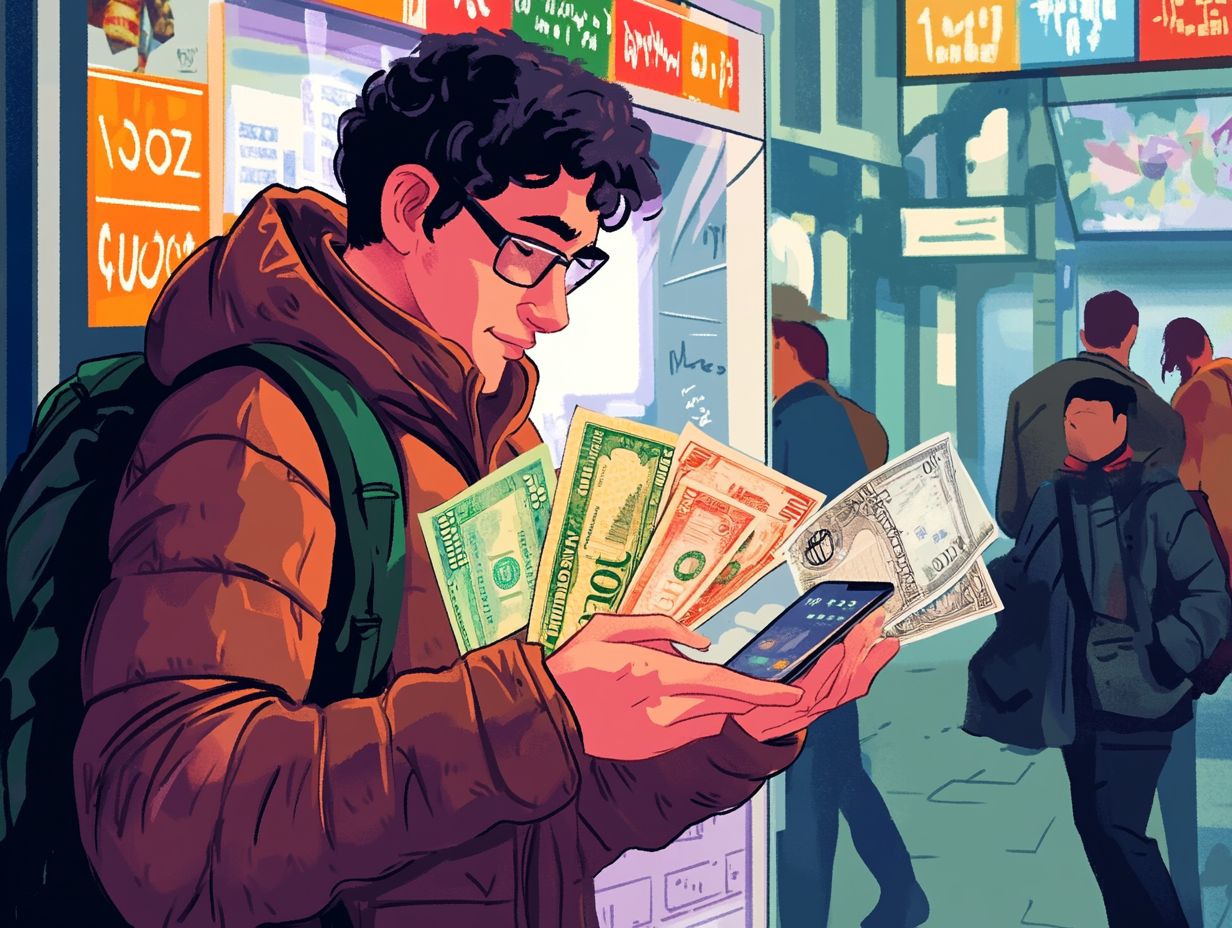
Avoiding hidden fees during currency exchange is essential for safeguarding your financial security while traveling. These fees can swiftly diminish your budget and travel savings. Understanding the various charges associated with different exchange methods is crucial for effective budgeting.
One common hidden fee to be wary of is the markup on exchange rates, which can significantly inflate your costs. Currency exchange services often add a premium to the market rate, leading to less favorable exchange rates.
To minimize this risk, take the time to compare rates from multiple sources think banks, airport kiosks, and online platforms. Transaction fees on ATM withdrawals can accumulate quickly, so choose ATMs affiliated with your bank and make larger withdrawals less frequently.
By actively researching currency exchange policies and using cards with minimal foreign transaction fees, you can further enhance your financial safety while you explore new destinations.
Negotiating Rates
Negotiating rates for currency exchange can yield substantial savings, especially for savvy travelers like you who understand market values and are ready to engage with exchange service providers. This strategic approach enhances your financial planning and allows for more effective cash management during your trips.
By understanding currency fluctuations and keeping a close watch on the latest trends, you give yourself the power to negotiate better deals. Exploring various providers whether at airports, banks, or online platforms enables you to uncover more favorable rates that can make a real difference.
Building rapport with currency exchange staff can also be advantageous. A friendly demeanor might lead to reduced fees or boosted rates. Knowing the average spread or margin gives you leverage during negotiations, paving the way for discussions that translate into tangible financial benefits.
Timing Your Exchange
Timing your currency exchange can greatly impact the competitive rates you secure, shaping your overall travel experience. Understanding how to monitor currency fluctuations helps minimize risks and optimize financial planning.
To navigate the complexities of foreign exchange markets like pinpointing the best moments to buy or sell your currency it’s essential to keep an eye on economic indicators and geopolitical events that influence currency values.
Leveraging online tools and mobile apps can provide you with real-time alerts on rate changes, giving you the power to make swift decisions.
Consider establishing a foreign currency account, which is an account that holds money in a different currency and often yields better rates than standard exchange options.
By actively tracking movements and employing strategic timing, you can ensure seamless financial transitions, ultimately enhancing your journeys.
Frequently Asked Questions
What is the best way to exchange currency when traveling on a shoestring budget?
To get the best exchange rates on a budget, research and compare rates at local banks and kiosks before your trip. Steer clear of exchanging currency at airports or tourist spots they often hit you with higher fees!
Should I exchange all of my money at once, or as I go?
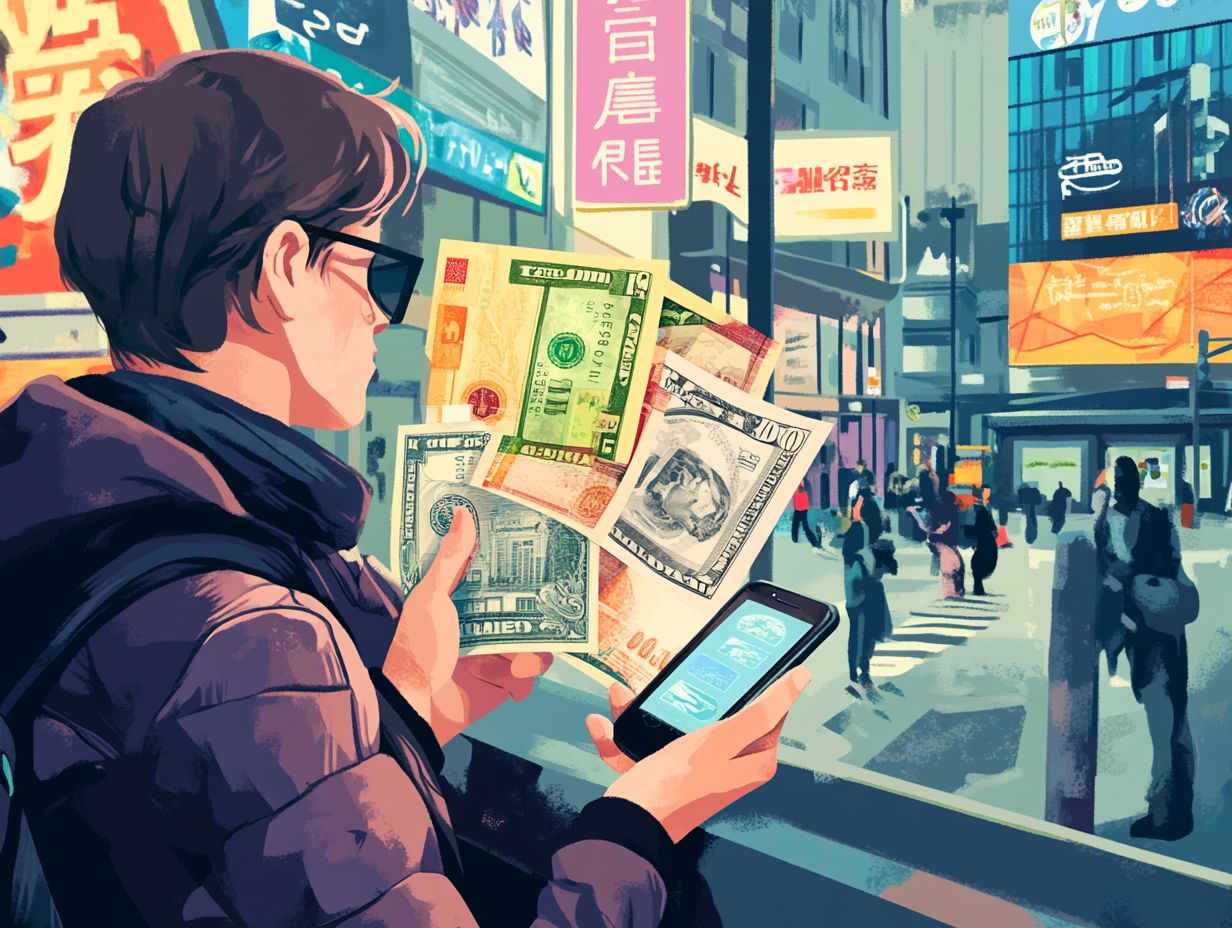
Exchange only the amount of money you will need for your immediate expenses. This helps you avoid carrying large amounts of cash and losing money if the exchange rate changes.
What is the difference between exchanging currency at a bank and a currency exchange kiosk?
Banks generally have better exchange rates but may charge higher fees. Currency exchange kiosks offer convenient locations but often have lower exchange rates and hidden fees. It’s important to compare both options before making a decision.
Is it better to use cash or credit cards when traveling?
Using both cash and credit cards while traveling is often recommended. Cash is useful for small purchases and may be required in certain locations.
Credit cards provide better fraud protection. They may also offer better exchange rates.
How can I avoid being scammed when exchanging currency?
To avoid scams when exchanging currency, use only licensed services. Stay away from street exchanges and always count your cash after a transaction!
Can I exchange currency back to my original currency after my trip?
Yes, you can exchange your currency back to your original currency after your trip. Be aware that you might lose money due to changes in currency value and fees.
